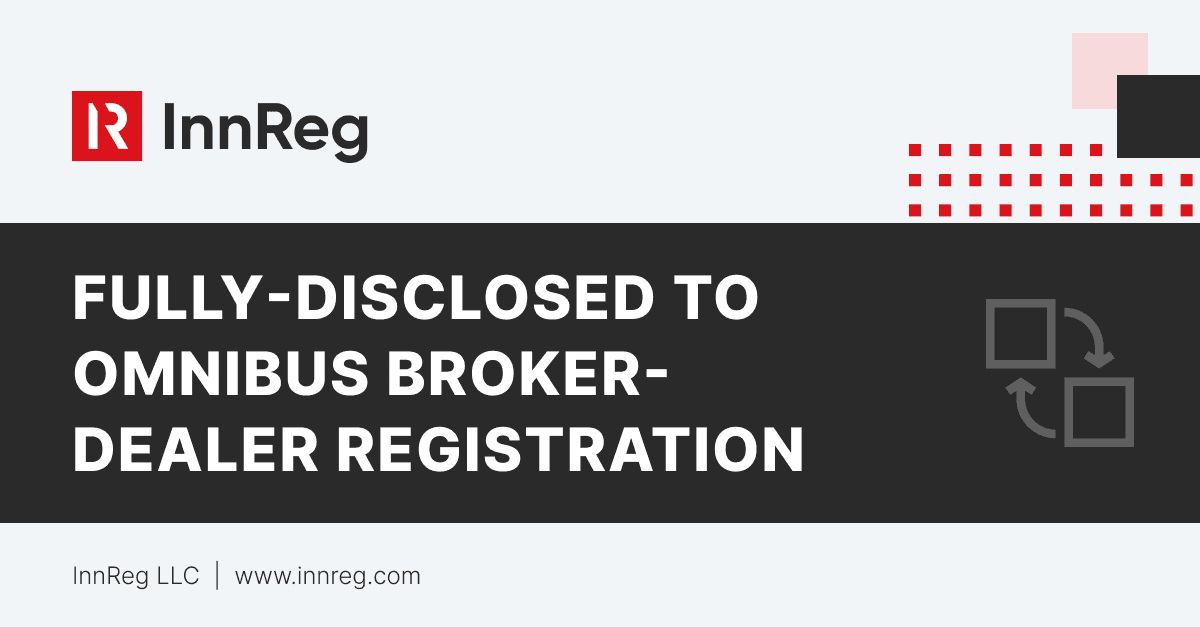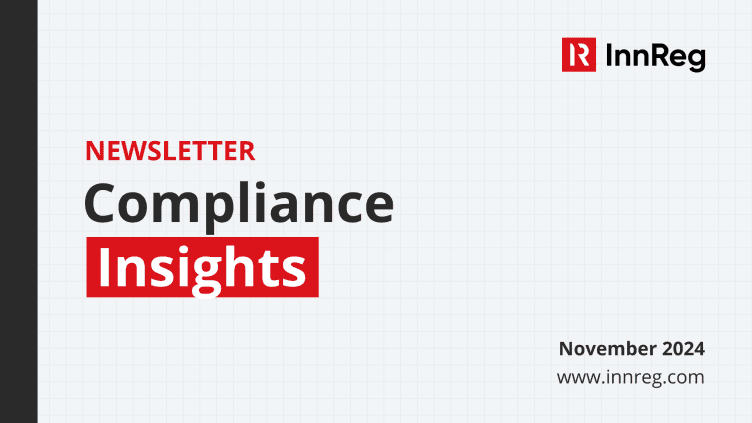
Broker-Dealers
From Fully-Disclosed to Omnibus Broker-Dealer Registration
Sep 29, 2023
·
InnReg
·
7 min read
Contents
Are you a fully-disclosed broker-dealer that considers converting to an omnibus clearing model?
If so, then read through this article to learn the following:
What is an Omnibus Broker-Dealer?
In What Ways is the Omnibus Broker-Dealer Different from the Fully-Disclosed Broker-Dealer?
What Are the Top 3 Advantages of the Omnibus Broker Dealer Model?
Why Are Many Broker-Dealers Considering Their Conversion to an Omnibus Broker-Dealer?
Can the Omnibus Broker-Dealer Model Be The Key To Your Growth?
Let’s shed more light on the topic.
See also:

InnReg is a global regulatory compliance and operations consulting team serving financial services companies since 2013. If you need assistance with compliance or fintech regulations, click here.
Executive Summary
Smaller broker-dealers are facing intense market pressures at the moment. Fees are declining, and the big players are getting bigger. Digital broker-dealers might wonder whether they made the right move when choosing a fully-disclosed model instead of an omnibus broker-dealer model.
Despite conventional wisdom, it is possible to convert to an omnibus model. Compliance experts can help you navigate the process.
And the result?
New revenue streams, and new ways to offer value.
What is an Omnibus Broker-Dealer?
Omnibus is a clearing arrangement in which an omnibus broker-dealer carries the positions of the introducing broker’s end-customer trades into a single account. This broker-dealer handles tasks pursuant to an agreement with a clearing broker, such as:
clearance
settlement
execution, and
custody of securities
Under the omnibus arrangement, the clearing broker remains legally responsible for securities custody and clearing.
The Omnibus Broker-Dealer Distinction
In practical terms, an omnibus-broker dealer opens an omnibus account with a clearing firm. In this type of account, the omnibus broker-dealer holds the investments, such as stocks and bonds, of its customers.
The Fully-Disclosed Broker-Dealer
In a fully disclosed arrangement, the introducing broker introduces transactions to a clearing firm that handles the clearance, settlement and custody. The arrangement is called fully-disclosed because the introducing broker is required to disclose all customer-related data to the clearing broker including:
personal identifying information (PII),
banking data,
trade details, and
other transaction-relevant information.
Under this model, separate trading accounts are opened in the name of customers at the clearing firm.
The fully-disclosed model undoubtedly allows for a faster and cheaper path to market, and for lower compliance and operational burdens. However, it creates dependencies in how orders are placed, how transactions are cleared and settled, how statements and reports are generated, how compliance is managed, etc.
The fully-disclosed broker-dealer model also narrows down options to a very small set of clearing firms that can handle the business requirements of large-volume digital brokers activity.
What is the Difference Between Fully-disclosed and Omnibus Broker-dealer?
The omnibus broker-dealer is different from the fully-disclosed one mainly because it allows for:
Consolidation of multiple accounts into a single one,
Managed trades of more than one customer, and
Not sharing customer information with the clearing firm.
What are Some of the Advantages of the Omnibus Broker-Dealer Model?
In addition to offering full the advantages indicated above, the omnibus broker-dealer model also provides:
Greater latitude in finding new revenue streams beyond commissions and fees;
The ability to substantially customize the customer experience and internal operational systems and workflows, rather than depending on the few clearing firms that can offer them; and
More flexible options for integration with other financial services to broaden the range of products to offer to customers
More flexibility to enter B2B deals.
Why Are Many Broker-Dealers Considering Their Conversion to an Omnibus Broker-Dealer?
Smaller digital broker-dealers are starting to face significant market pressure and revisit their business model. Why? Large incumbent platforms have joined recent innovative broker dealers in offering commission-free trading, and already feature a wide range of investment options from equities to ETFs to alternative assets.
As a result, they are raising the bar for smaller digital broker-dealers to compete for new investors and retain existing ones.
See also:
A Tough Climate for Small Broker-Dealers
These aggressive moves by legacy players may well drive smaller players out of business or foster market consolidation, because they make it very difficult to compete on price. For digital broker-dealers now, the pressure is on. To stay in a fight, they need to find new revenue streams, new pockets of investors, and new ways to offer differentiated value.
One challenge to overcome is the realities of the digital broker-dealer business model. Many went into operation on a fully-disclosed basis, relying on clearing firms to take on a large portion of the technology requirements, compliance and reporting duties, and financial responsibilities.

Need help with broker-dealer compliance?
Fill out the form below and our experts will get back to you.
Omnibus Broker-Dealer vs. Fully-Disclosed
The exception to this traditional model is the omnibus one, where the introducing broker-dealer executes and clears all of their customers’ trades through one single account at the clearing broker. With the omnibus broker-dealer, the customers’ identities and information do not have to be shared and the omnibus broker will be the one who manages all customer activity.
Rising Interest in the Omnibus Broker-Deal Model, But Concerns Remain
An increasing number of digital broker-dealers are coming to InnReg recognizing they need to break through these constraints to stay ahead of the changing market. For some, converting from a fully-disclosed model to an omnibus broker-dealer can open up significant advantages.
Some in the industry shy away from even considering converting to such a model, or registering as an omnibus broker-dealer in the first place, because of its reputation as a challenging process to implement. The fear is that it may push broker-dealers into unknown territory with recordkeeping and compliance.
However, in our experience as a full-service compliance provider, it is quite feasible to help digital broker-dealers unlock the advantages of an omnibus structure.
Top Three Omnibus Broker-Dealer Advantages
1. Greater latitude in finding new revenue streams beyond commissions and fees.
Omnibus accounts make it easier to derive revenue from sources such as interest on uninvested cash, premium services including margin lending, and order flow payments.
2. The ability to substantially reduce costs. You can build out internal recordkeeping capabilities rather than depending on the few clearing firms that can offer them.
With a wide range of clearing options to compare, the omnibus basis allows broker-dealers to negotiate a better deal, lowering what is usually the largest part of their operating costs
3. More flexible options for technology integrations and B2B deals.
For example, this flexibility helps a broker-dealer tap into lucrative cross-border investors. They can make arrangements directly with international providers of digital financial services such as other broker-dealers, international fund transfer companies, etc.
Breaking Through the Four Most Popular Myths About the Omnibus Broker-Dealer
Because of the complexity of registering on an omnibus basis, tapping into these advantages may seem intimidating; there are many misconceptions and exaggerated anxieties about omnibus conversion in the industry.
A practiced hand can guide you through with a more balanced and objective way to think about these concerns about converting to an omnibus structure.
1. Technical Barriers Myth
No doubt, building out new technologies can be a challenge, and the omnibus broker-dealer model does require new technology. In today's world of Software-as-a-Service and APIs, however, you should not assume that you have to build your own technology stack end-to-end by yourself. The right consulting partner can walk you through the process of partner selection and technology integration. Your IT capabilities are not confined to the four walls of your own company with a service-based IT approach.
2. Regulatory Risk
Increased regulatory scrutiny does raise the bar in terms of the amount of customer and transaction-level data that broker-dealers must collect. While subaccounting in the omnibus model does raise its own recordkeeping challenges, ultimately these are no more or less complex than fully-disclosed accounts if you (re)design compliance workflows and implement them accordingly.
3. The Self-Clearing Myth
The omnibus broker-dealer model is sometimes conflated with the notion of migrating fully to self-clearing. The two are not mutually dependent. As mentioned above, this model allows you to work with more clearing firms because you take on more of the load with middle- and back-office functions. However, if your business were to grow to the scale that self-clearing becomes a financially viable option, a previous migration to the omnibus model ultimately will make that easier.
4. Front Office Focus
A well-designed compliance program mitigates the risk of needing to divert resources from user acquisition and product development. In addition, the world of finance is continuing to evolve into a model where firms can create bundles of services, including outsourcing compliance and non-core back-office processes.
If you engage a reliable outsourced compliance provider with a fully functioning back-office operations facility and knowledge of the latest APIs and cloud-based solutions, all integrated with your user acquisition and client service workflows, there is no loss of focus on excellence in front-office capabilities.
Can the Omnibus Broker-Dealer Model Be Your Life-Line?
For many digital broker-dealers, rethinking the business model will shift quickly from a future consideration to an existential business model decision. If you see the writing on the wall and are struggling to react to a world where no-fee, no-commission trading is the norm, converting to an omnibus broker-dealer may offer you a life-line.
To sum up our analysis, we offer you the following comparative table.
Fully-Disclosed vs. Omnibus Broker-Dealer

As can be seen on the table, the fully-disclosed broker will generally have lower financial requirements in terms of registration, required capital, technology investment and hiring.
However, the two most significant advantages of the omnibus model are the flexibility to integrate non-brokerage services and the latitude in entering B2B arrangements. Ultimately, they allow the omnibus broker-dealer to offer a comprehensive and tailored solution to its clients, meeting a wider range of their financial needs and fostering stronger client relationships.
Let's have a conversation about which model makes the most sense for your business.
See also:
What Specific Financial Regulations Pertain to Omnibus Broker-Dealers?
Some FINRA rules pertain to omnibus broker-dealers: Rule 15c3-1 (Net Capital Rule), Rule 15c3-3 (Customer Protection Rule), and SEC Rule 606 of Regulation NMS. Although other FINRA rules regulating broker-dealers also apply to omnibus broker-dealers.
How Can InnReg Help?
InnReg is a global regulatory compliance and operations consulting team serving financial services companies since 2013.
We are especially effective at launching and scaling fintechs with innovative compliance strategies and delivering cost-effective managed services, assisted by proprietary regtech solutions.
If you need help with broker-dealer compliance, reach out to our regulatory experts today:
Published on Dec 30, 2019
Last updated on Sep 29, 2023
Related Articles
Latest LinkedIn Posts












